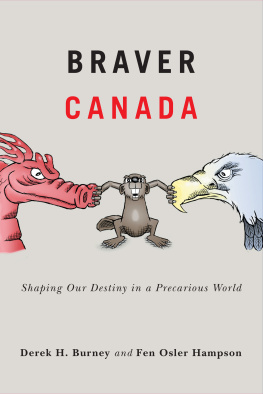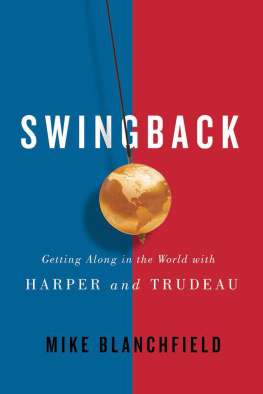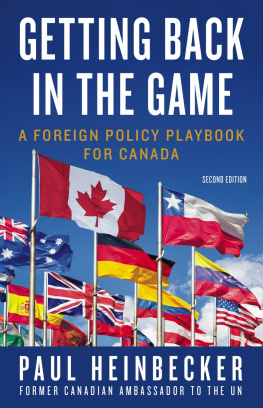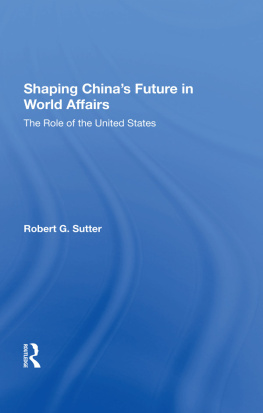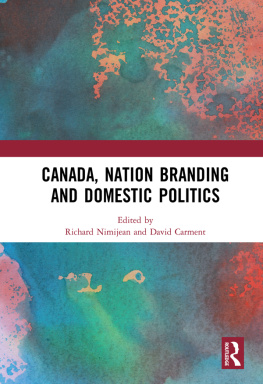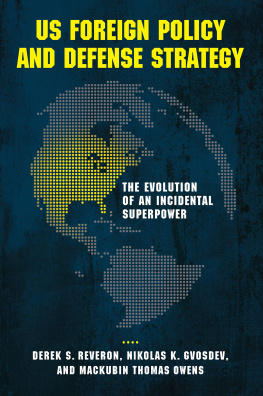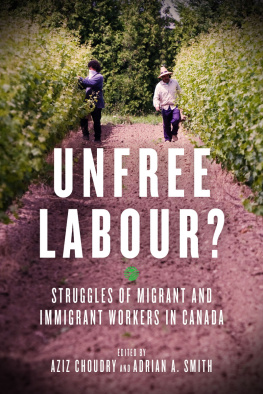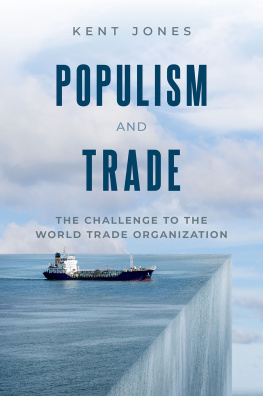
BRAVER CANADA
McGill-Queens/Brian Mulroney Institute of Government Studies in Leadership, Public Policy, and Governance
SERIES EDITOR: DONALD E. ABELSON
Titles in this series address critical issues facing Canada at home and abroad and the efforts policymakers at all levels of government have made to address a host of complex and multifaceted policy concerns. Books in this series receive financial support from the Brian Mulroney Institute of Government at St Francis Xavier University; in keeping with the institutes mandate, these studies explore how leaders involved in key policy initiatives arrived at their decisions and what lessons can be learned. Combining rigorous academic analysis with thoughtful recommendations, this series compels readers to think more critically about how and why elected officials make certain policy choices, and how, in concert with other stakeholders, they can better navigate an increasingly complicated and crowded marketplace of ideas.
1 Braver Canada
Shaping Our Destiny in a Precarious World
Derek H. Burney and Fen Osler Hampson
BRAVER CANADA
Shaping Our Destiny in a Precarious World
Derek H. Burney and Fen Osler Hampson
McGill-Queens University Press
Montreal & Kingston London Chicago
McGill-Queens University Press 2020
ISBN 978-0-2280-0092-1 (cloth)
ISBN 978-0-2280-0218-5 (ePDF)
ISBN 978-0-2280-0219-2 (ePUB)
Legal deposit first quarter 2020
Bibliothque nationale du Qubec
Printed in Canada on acid-free paper that is 100% ancient forest free
(100% post-consumer recycled), processed chlorine free
We acknowledge the support of the Canada Council for the Arts.
Nous remercions le Conseil des arts du Canada de son soutien.
Library and Archives Canada Cataloguing in Publication
Title: Braver Canada : shaping our destiny in a precarious world / Derek H. Burney and Fen Osler Hampson.
Names: Burney, Derek H. (Derek Hudson), 1939 author. | Hampson, Fen Osler, author.
Description: Series statement: McGill-Queens/Brian Mulroney Institute of Government Studies in Leadership, Public Policy, and Governance ; 1 | Includes bibliographical references and index.
Identifiers: Canadiana (print) 20190234342 | Canadiana (ebook) 20190234431 | ISBN 9780228000921 (cloth) | ISBN 9780228002185 (ePDF) | ISBN 9780228002192 (ePUB)
Subjects: LCSH: CanadaForeign relationsForecasting. | LCSH: CanadaForeign economic relationsForecasting. | LCSH: CanadaEconomic policy21st centuryForecasting. | LCSH: CanadaSocial policyForecasting.
Classification: LCC FC242 .B867 2020 | DDC 327.71009/05dc23
This book was typeset in 11/14 Sabon.
Contents
Preface and Acknowledgments
America First Trumpism, the rise of China, populism, and authoritarianism are creating a less interdependent world, requiring a significant shift in Canadas global approach in an era of profound change. So too is the erosion of international institutions and conventions that have held the West together for seven decades a trend that will persist after President Donald Trump leaves office. As former Canadian prime minister Stephen Harper has observed, it is a polarized world, and regardless of whether Trump succeeds, Trumps America First motto will likely survive his presidency.
As a new tide of protectionist populism sweeps across the United States, Europe, and other corners of the globe, the open economic trading and investment regime that was crafted after the Second World War is under siege. Beggar-thy-neighbour policies are redefining NAFTAs future and relations between Canada, the United States, and major trading partners in the Pacific and Europe. Europe is struggling with its own internal problems as populist pressures manifest themselves in Brexit and public disenchantment with the dominance of Brussels and Berlin in the European Union.
The centre of economic and political gravity in the world is also rapidly shifting toward the Indo-Pacific as China and India become global powers and other countries in the region, like Indonesia, Vietnam, and the Philippines, experience rapid growth. Canada has no coherent policy to deal with these rising powers, especially with China. It needs to consider a more rules-based economic partnership and to adopt a clearer position on the burgeoning military and cyber threat posed by China in the region, if not globally.
For the past three decades, the bedrock of Canadas foreign policy and international engagements has been a strong economic and political relationship with the United States and a commitment to maintaining and strengthening the international institutions of the postwar liberal international order the United Nations, the Bretton Woods institutions, the World Trade Organization, and NATO. That bedrock is now crumbling as the United States unilaterally erects new barriers to trade and investment, transatlantic security ties weaken, and international institutions are assaulted by the twin forces of populism and authoritarianism, which are emerging not just among the Wests adversaries but also within the West itself.
As Canada looks for new economic partnerships, its first task is on the home front, where it must reverse the decline in its competitiveness in North America and establish genuine free trade within Canada. A strong global performance depends on constructive policies at home. Responsible development of Canadas energy resources, which contribute roughly 10 per cent of its GDP, is also needed. So too are realistic and balanced commitments on climate change. Canadas security, economic prosperity, and democratic institutions are increasingly compromised by the threat from cyber space, as the New York Times Washington bureau chief, David Sanger, underscores in his book The Perfect Weapon. Canada is content being a fast follower, but can it be sure that the United States will continue to share technology on things like quantum computing in a more narrowly drawn competitive world?
When Canada got into a very public spat with Saudi Arabia over that nations treatment of jailed human rights activists, Canada found that it could not count on the support of two of its closest allies: the United States and the United Kingdom. The episode serves as a stark reminder of how much the world has changed during the past several years. A new generation of despotic leaders around the world from Southeast Asia to Sub-Saharan Africa to the Middle East whose nations have traditionally sought to curry favour with the West, now brazenly thumb their noses at the West and Western values. (Canada is no exception; Sweden and Germany have also experienced Saudi wrath.) Democracy worldwide is in decline. The West is more confused and divided, not least because of the political and diplomatic discord sowed by US president Donald Trump and the antics of Russian president Vladimir Putin, who is manipulating Western disunity to his own advantage in Ukraine, eastern Europe, the Middle East, and China. The NATO Alliance, which has been the bedrock of global security since the early days of the Cold War, is also fracturing because of volatile and unpredictable US behaviour and because of alliance partners, notably Germany, who are reluctant to carry their proper share of the defence burden.
Confronted with the greatest refugee crisis since the Second World War, governments throughout Europe are closing borders to stem the human tide from Syria, North Africa, and points beyond. Xenophobia is also manifesting itself in the rise of extreme right-wing populist parties. The refugee-asylum-immigration nexus has to be handled in a way that meets legitimate concerns about abuse of procedural loopholes and bureaucratic incompetence and in a way that fosters constructive actions that remedy a mounting backlash against immigration generally.
Next page
